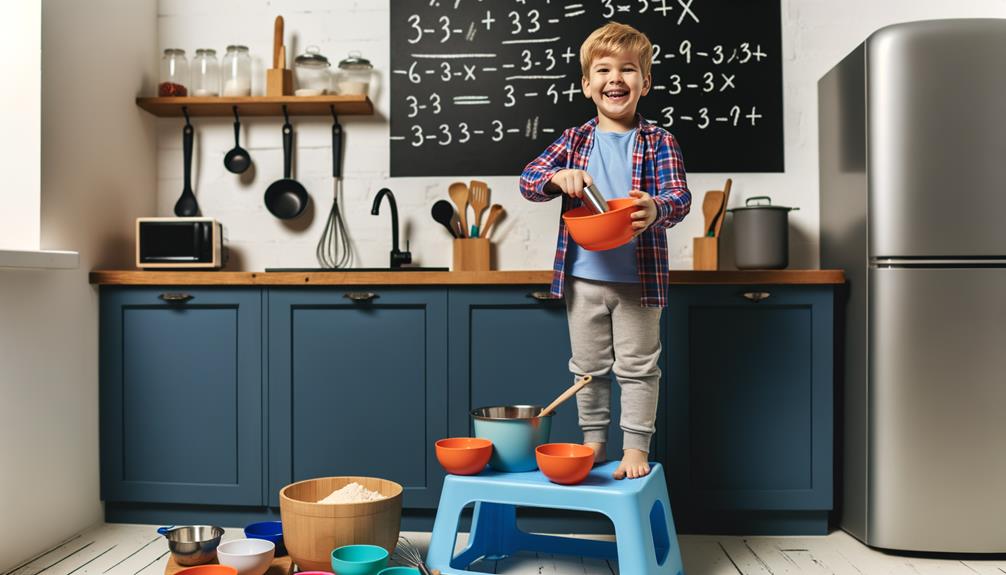Did you know that cooking can actually help children develop not only their math skills but also their emotional intelligence?
It may seem surprising, but the kitchen can be a valuable classroom for children to learn and grow. From counting and measuring ingredients to problem-solving and following instructions, cooking offers a wide range of opportunities for children to enhance their cognitive and emotional abilities.
But that’s not all – there’s even more to discover about how cooking can positively impact children’s development.
So, let’s explore the fascinating ways in which this everyday activity can contribute to their overall growth and learning.
Counting and Measuring in the Kitchen
Developing problem-solving and critical thinking skills in the kitchen goes beyond just counting and measuring. It provides children with opportunities to apply their mathematical knowledge in practical situations and encourages them to think creatively and analytically. By engaging in tasks such as recipe reading, ingredient substitution, and adjusting cooking times, children develop their logic and reasoning abilities.
Cooking involves making decisions and solving problems in real-time. For example, when a recipe calls for a missing ingredient, children must think quickly to find a suitable substitute. They also learn to adjust recipes based on personal preferences or dietary restrictions. These experiences foster decision-making skills and problem-solving abilities.
In the kitchen, children encounter challenges that require them to think critically. They learn to troubleshoot issues that arise during cooking, such as adjusting heat levels or fixing a lumpy sauce. Through these experiences, children develop resilience and perseverance, as they learn to overcome obstacles and find solutions.
Research suggests that engaging in cooking activities can improve children’s problem-solving and critical thinking skills. It provides an interactive and hands-on learning environment where children can apply mathematical concepts and develop their logical reasoning abilities.
Following Instructions and Sequencing
When children participate in cooking activities, they learn the importance of following instructions and sequencing steps in order to create a successful dish. The ability to follow instructions is crucial in cooking, as it ensures that the dish is prepared correctly and achieves the desired outcome. This skill also translates to other areas of life, such as school assignments or completing tasks at home.
Additionally, sequencing steps is an essential part of cooking, as it helps children understand the importance of time management in the kitchen. They learn that certain steps need to be done in a specific order to achieve the best results.
Through food preparation, children also enhance their fine motor skills. Chopping vegetables, stirring ingredients, and measuring quantities require precision and control, allowing them to develop their hand-eye coordination and dexterity. These skills aren’t only valuable in the kitchen but also in various activities that involve using their hands, such as writing and playing musical instruments.
Creativity and Expression Through Cooking
As children engage in cooking activities, they not only develop important life skills but also have the opportunity to express their creativity through the art of cooking. Culinary exploration allows children to experiment with different flavors, textures, and ingredients, giving them the freedom to create unique dishes that reflect their own tastes and preferences. This encourages them to think outside the box and come up with innovative recipes.
Cooking isn’t just about following a recipe; it’s a sensory experience that stimulates all five senses. Children can use their sense of touch to knead dough, their sense of taste to adjust seasoning, their sense of smell to enjoy the aroma of herbs and spices, and their sense of sight to create visually appealing presentations. They can also incorporate their sense of hearing by listening for sizzling sounds or the sound of a cake rising in the oven.
Furthermore, cooking provides a platform for self-expression. Children can personalize their dishes by adding their favorite ingredients, experimenting with different plating techniques, and even naming their creations. This allows them to showcase their individuality and creativity to others.
Building Emotional Intelligence Through Collaboration
Collaboration in cooking activities fosters emotional intelligence in children, allowing them to develop important social and interpersonal skills. Research has shown that collaborative learning experiences, such as cooking together, promote empathy development in children.
When children work together in the kitchen, they learn to communicate effectively, listen to others’ ideas, and respect each other’s perspectives. They develop the ability to work as a team, take turns, and share responsibilities. These experiences teach children the importance of cooperation and help them build strong relationships with their peers.
Cooking activities also provide opportunities for children to practice empathy. As they work together to create a dish, they learn to consider the needs and preferences of others. They develop an understanding of how their actions can impact others and learn to be more considerate and compassionate.
In addition, collaborative cooking experiences allow children to develop problem-solving skills. They learn to think critically, make decisions, and find solutions together. These experiences not only enhance their emotional intelligence but also contribute to their overall cognitive development.
Cooking isn’t just about making delicious meals; it’s a powerful tool for children’s development. From mastering math skills through measuring ingredients to building emotional intelligence through collaboration, the kitchen offers endless opportunities for growth.
Like a secret ingredient, cooking nurtures problem-solving, creativity, and critical thinking skills. It’s a recipe for success, blending culinary delights with the sweet taste of cognitive and emotional development.
So, let’s invite our little chefs into the kitchen and watch them rise to their full potential.




